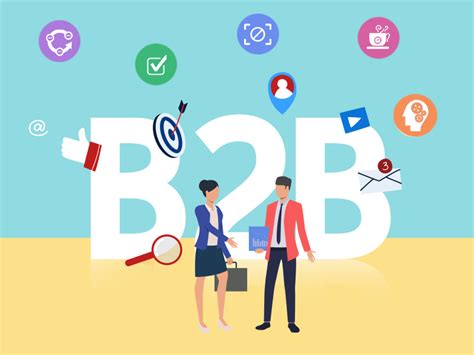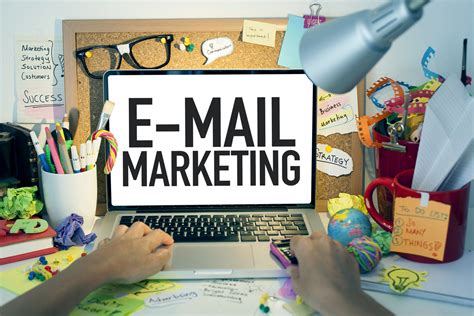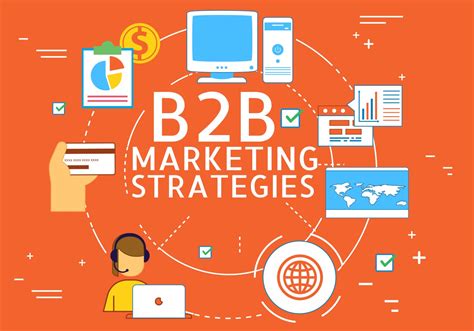In the competitive landscape of the B2B market, understanding the art of acquiring high-quality leads is paramount for any business striving for growth and success. Crafting successful strategies to generate valuable prospects and convert them into loyal customers is no longer just a beneficial endeavor, but a necessity.
Exploring the diverse approaches available to businesses seeking to acquire B2B leads, this article delves into the top 10 winning strategies that have proven to be effective in today's dynamic market. Emphasizing the significance of a holistic approach, this comprehensive guide uncovers the secrets behind connecting with potential clients and nurturing long-lasting relationships in an ever-evolving business environment.
Through the use of strategic marketing initiatives, targeted outreach, and innovative techniques, businesses can forge impactful connections and secure a competitive edge in the realm of lead generation. Understanding the intricacies of the B2B buying process, this article reveals tried-and-tested methods that drive successful lead acquisition and empower businesses to thrive in a competitive marketplace.
With a focus on building rapport, establishing authority, and leveraging cutting-edge technology, this article provides invaluable insights into the realm of B2B lead generation. By implementing the strategies presented here, businesses can revolutionize their approach, enhance conversion rates, and ultimately maximize their growth potential in the lucrative B2B sector.
Harnessing the Potential of Social Media for Successful B2B Prospecting

Boosting B2B lead generation can seem like a daunting task, but with the right tools at your disposal, it's possible to tap into a vast reservoir of potential prospects. One such tool that has revolutionized the way businesses connect and engage with their target audience is social media. Leveraging the power of various social media platforms can significantly enhance your B2B lead generation efforts and drive valuable business opportunities.
Establish a Strong Social Media Presence: Building a robust presence on social media platforms is the foundation for effectively harnessing their power. Invest time in creating compelling profiles and pages that reflect your brand's image and values. This establishes credibility and makes it easier for potential leads to find you.
Identify Relevant Social Media Channels: Not all social media platforms are created equal. It's essential to identify the platforms where your target audience is most active. By understanding your audience's preferences and habits, you can focus your efforts on the platforms that will yield the highest ROI.
Create Engaging Content: In the ever-evolving landscape of social media, compelling content reigns supreme. Share industry insights, informative articles, and thought-provoking content that adds value to your audience's professional lives. By consistently delivering high-quality content, you establish your brand as a trusted resource, attracting leads in the process.
Engage and Interact: Don't just broadcast your message–actively engage and interact with your audience. Respond to comments, answer questions, and initiate conversations on social media. By fostering meaningful connections, you build trust and credibility, positioning yourself as an industry expert and generating potential leads.
Utilize Social Media Advertising: Social media platforms offer targeted advertising options that enable you to reach your ideal audience effectively. Leverage these advertising features to amplify your message and increase your visibility within your niche market. Strategic ad campaigns can yield a higher number of qualified leads with a high chance of conversion.
Employ Influencer Outreach: Collaborating with influencers can be a powerful way to reach a wider audience within your industry. Identify influencers relevant to your niche and work with them to create mutually beneficial partnerships. Their endorsement and reach can significantly boost your brand's visibility and generate valuable leads.
Monitor and Analyze: Social media platforms provide comprehensive analytics tools to monitor the performance of your campaigns. Regularly analyze these metrics to evaluate the success of your lead generation strategies. Identifying trends and patterns will help you refine your approach and optimize your efforts for maximum results.
Stay Up-to-Date with Social Media Trends: The social media landscape is constantly evolving, and new trends emerge regularly. Stay informed about the latest platform updates, algorithms, and user behaviors to adapt your strategies accordingly. By staying ahead of the curve, you can maintain a competitive edge and continue to generate quality B2B leads.
Encourage User-Generated Content: Harness the power of your existing customers and followers by encouraging them to create and share content related to your brand. User-generated content not only boosts engagement but also acts as a powerful tool for attracting new leads. Leverage reviews, testimonials, and case studies to showcase your brand's value and reliability.
Cultivate Strategic Partnerships: Identify complementary businesses or industry associations with which you can form strategic partnerships. Collaborate on joint content, webinars, or events to expand your reach and tap into each other's networks. By leveraging each other's audiences, you can generate quality leads through mutual recommendations.
Incorporating social media into your B2B lead generation strategies provides immense potential for expanding your reach, engaging with your target audience, and ultimately driving valuable business opportunities. By implementing these strategies and continuously adapting to the dynamic social media landscape, you can propel your B2B lead generation efforts to new heights.
Create Captivating and Relevant Content
In today's highly competitive business landscape, capturing the attention of potential clients and generating quality leads requires creating compelling and relevant content. By crafting captivating materials that resonate with your target audience, you can effectively drive engagement, establish your brand as a thought leader, and ultimately attract more valuable leads.
When it comes to creating captivating content, it is crucial to understand the needs, pain points, and interests of your potential B2B customers. By conducting thorough research and gathering insights about their industry, challenges, and goals, you can tailor your content to address their specific needs and provide valuable solutions.
Compelling content not only captures the attention of your audience but also triggers emotions and prompts action. Through powerful storytelling, relatable examples, and persuasive messages, you can captivate your audience and inspire them to take the desired next step in their buyer's journey.
Relevance is a key factor in creating effective B2B content. By understanding your target market's preferences, demographics, and industry trends, you can ensure that your content aligns with their interests and demands. Providing valuable and up-to-date information demonstrates your expertise and builds trust with your audience, making them more likely to engage with your brand and convert into leads.
In addition to textual content, visual elements such as infographics, videos, and images can enhance the effectiveness and engagement of your B2B content. Including visually appealing and informative visuals can help deliver complex information in a more digestible and appealing format.
To drive continuous lead generation, it is essential to regularly create and distribute compelling and relevant content. By maintaining a consistent schedule and utilizing various distribution channels, such as social media, email marketing, and industry publications, you can reach a wider audience and maximize your content's impact.
It is worth noting that quality over quantity should be prioritized. While it is important to maintain a regular content production schedule, ensuring the quality, accuracy, and usefulness of your content is paramount. Investing time and effort into creating well-researched, well-written, and valuable content will yield better results in terms of lead generation and customer engagement.
In conclusion, creating captivating and relevant content plays a crucial role in B2B lead generation. By understanding your target audience, tailoring your content to their needs, and delivering valuable and visually appealing materials, you can effectively capture their attention, establish your brand's authority, and ultimately drive more high-quality leads for your business.
Utilizing Email Marketing Campaigns

The integration of email marketing campaigns plays a crucial role in the sophisticated process of generating potential business-to-business (B2B) leads. Crafting well-planned and targeted emails enables companies to establish meaningful connections, engage with their target audience, and direct leads towards conversion, all while fostering long-term relationships with clients.
Implementing a strategic email marketing campaign involves creating personalized content that resonates with prospective B2B clients. By tailoring the messaging to address specific pain points and offering viable solutions, companies can effectively capture the attention of leads.
Segmented Email Lists: Segmenting the email list allows businesses to categorize leads based on relevant criteria such as industry, company size, or previous interactions. By sending highly targeted emails, tailored to the specific needs and interests of these segments, companies can increase the chances of engagement and conversion. |
Compelling Subject Lines: Crafting compelling subject lines is imperative to capture the interest of B2B leads and entice them to open the email. Using concise and impactful language, businesses can evoke curiosity, highlight benefits, or offer exclusive insights, motivating recipients to learn more by clicking through. |
Persuasive Content: The content within the email should focus on delivering value to the reader. By providing informative and persuasive content, such as industry insights, case studies, or customer success stories, B2B companies can establish credibility and position themselves as trusted solution providers. |
Clear Call-to-Action: Each email should include a clear and compelling call-to-action (CTA) that guides the recipient towards the desired action. Whether it is to download a whitepaper, schedule a demo, or request more information, a well-placed CTA ensures a seamless and intuitive conversion process. |
Email Automation: Implementing email automation tools enables businesses to streamline their lead generation efforts. By setting up automated sequences and triggers based on specific actions or time intervals, companies can maintain consistent engagement with B2B leads, nurturing them throughout the sales funnel. |
Personalization: Personalizing emails with the recipient's name, company details, or previous interactions adds a human touch and enhances the overall customer experience. By showing that the communication is tailored and relevant to their specific needs, B2B companies can foster stronger connections and increase engagement. |
A/B Testing: Conducting A/B testing on different elements of the email, such as subject lines, content, or design, allows businesses to identify the most effective strategies for capturing and retaining B2B leads. By analyzing data and iterating based on the results, companies can optimize their email campaigns for better performance. |
Email Analytics: Utilizing email analytics tools provides valuable insights into the performance of email marketing campaigns. Monitoring open rates, click-through rates, and conversion metrics allows businesses to gauge the effectiveness of their strategies, make data-driven decisions, and continuously improve their lead generation efforts. |
Email List Growth: Constantly growing the email list is crucial for sustained B2B lead generation. Companies can achieve this by providing opt-in opportunities on their website, creating valuable gated content, or incentivizing sign-ups. Having a growing and engaged email subscriber base ensures a steady stream of potential leads to nurture. |
Email Deliverability: Ensuring high email deliverability is essential to maximize the reach and impact of email marketing campaigns. By following industry best practices, such as maintaining a clean email list, optimizing email templates for different devices, and adhering to anti-spam regulations, companies can increase the likelihood of their emails reaching the intended recipients. |
Optimizing Online Visibility for Increased Business Growth
In today's digital world, having a strong online presence is essential for businesses seeking growth and success. One of the most effective methods to enhance online visibility and attract potential customers is through implementing Search Engine Optimization (SEO) strategies. SEO involves making specific adjustments to your website and online content, so it ranks higher in search engine results when users search for relevant keywords or phrases. This section explores the significance of SEO for B2B lead generation and highlights key strategies for effective implementation.
| Benefits of SEO in B2B Lead Generation | |
|---|---|
| 1. Enhanced Organic Traffic: | By optimizing your website for search engines, you can increase organic traffic to your site from relevant search queries. This means more potential leads discovering your business without having to rely solely on paid advertising. |
| 2. Improved Brand Visibility: | When your website appears on the first page of search engine results, it enhances your brand's visibility and credibility. This can instill trust in potential customers and increase the likelihood of generating valuable leads. |
| 3. Targeted Audience Reach: | A well-optimized SEO strategy enables you to target specific keywords or phrases that are relevant to your B2B offerings. This helps you attract a more qualified audience, increasing the chances of converting them into leads. |
Implementing SEO for B2B lead generation requires a combination of technical and content optimization strategies. Some essential techniques to incorporate include:
- Keyword Research and Analysis: Conduct thorough research to identify keywords and phrases that your target audience is likely to search for. This forms the foundation of your SEO strategy.
- On-Page Optimization: Optimize website elements such as title tags, meta descriptions, headings, and content to align with targeted keywords. This helps search engines understand the relevance of your web pages.
- High-Quality Content Creation: Develop informative and engaging content that incorporates your target keywords naturally. Valuable content attracts visitors, enhances user experience, and increases the likelihood of lead generation.
- Link Building: Acquire high-quality backlinks from reputable websites in your industry. This demonstrates to search engines the authority and reliability of your website, further boosting its ranking.
- Mobile Optimization: Ensure your website is mobile-friendly, as an increasing number of users access the internet on mobile devices. Mobile optimization improves user experience and search engine rankings.
- Website Speed and Performance: Optimize your website's loading speed, as slow-loading sites often result in higher bounce rates and lower search engine rankings. Enhancing website performance enhances user experience and encourages lead generation.
- Monitoring and Analytics: Regularly monitor your website's performance using analytics tools. Analyze data such as organic traffic, keyword rankings, and conversion rates to identify areas for improvement and refine your SEO strategy.
- Local SEO: If your B2B business operates in specific locations, optimize your website for local search results. This helps attract geographically targeted leads, increasing the chances of converting them into customers.
- Constant Updates and Adaptation: SEO is an ongoing process, and search engine algorithms frequently change. Stay up to date with the latest trends and algorithm updates to ensure your SEO strategies remain effective.
By implementing these SEO strategies, B2B businesses can significantly enhance their online visibility, attract more qualified leads, and ultimately drive business growth.
Leveraging Influencer Marketing: Engaging Key Figures for B2B Business Growth

In the fast-paced world of B2B, where connections and credibility hold immense value, influencer marketing has emerged as a powerful strategy to drive lead generation and business growth. By collaborating with industry thought leaders, experts, and influential figures who possess significant online followings, businesses can effectively amplify their brand message, expand their reach, and establish themselves as reputable authorities in their respective fields.
Influencer marketing extends beyond merely endorsing a product or service; it involves building mutually beneficial relationships by identifying key influencers whose values align with those of the business. These influencers are experts in their domains and have built a loyal following through their content, expertise, and thought leadership. By leveraging these influential figures, B2B companies can tap into their audience and leverage their trust, which ultimately leads to increased brand awareness, credibility, and, ultimately, a steady stream of quality leads.
Collaborating with influencers can take various forms, from co-creating content such as blog posts, videos, or podcasts, to featuring them as guest speakers at industry events or participating in joint webinars. These partnerships showcase the influencer's expertise while allowing businesses to connect directly with their audience, positioning themselves as innovative problem solvers that can address their customers' pain points.
Furthermore, influencer marketing campaigns can extend beyond traditional social media platforms and include guest appearances in industry-specific podcasts, influencer-hosted webinars, or contributing guest articles on prominent industry publications. These opportunities not only provide businesses with access to the influencer's follower base but also help establish their authority and position them at the forefront of industry trends.
When carefully planned and executed, influencer marketing can be a cost-effective and targeted approach to generate high-quality leads. By selecting influencers who resonate with the target audience, B2B companies can create valuable partnerships that drive engagement, foster trust, and ultimately generate leads that are more likely to convert into long-term customers.
Use Webinars and Online Events
Harnessing the power of online platforms can be an invaluable strategy for businesses seeking to generate high-quality leads in the B2B space. One particularly effective approach involves leveraging webinars and online events to engage with potential customers, showcase expertise, and establish meaningful connections.
Engaging Content: Webinars and online events provide a unique opportunity to present engaging and informative content to a targeted audience. Through these interactive sessions, businesses can demonstrate their expertise, address industry pain points, and offer valuable insights and solutions.
Lead Capture: Webinars and online events enable businesses to capture leads effortlessly. By collecting contact information from attendees, such as email addresses and job titles, companies can build a solid database of potential clients to follow up with after the event.
Demonstrate Thought Leadership: Hosting webinars and online events positions businesses as thought leaders in their field. By sharing innovative ideas, best practices, and industry trends, companies can establish credibility and gain the trust of their target audience.
Networking Opportunities: Webinars and online events offer a networking platform for attendees to connect with industry professionals, potential partners, and thought leaders. This networking aspect enhances the chances of building mutually beneficial relationships and expanding professional networks.
Convenience and Accessibility: Unlike traditional in-person events, webinars and online events provide convenience and accessibility to a global audience. Attendees can join from anywhere, eliminating geographical limitations and maximizing participation.
Interactive Discussions: Webinars and online events often include interactive features such as live chat, polls, and Q&A sessions. These elements promote engagement and allow participants to actively contribute, fostering a sense of community and facilitating knowledge sharing.
Lead Nurturing: Following a webinar or online event, businesses can nurture leads by providing additional resources, personalized follow-ups, and exclusive offers. This ongoing engagement strengthens relationships and helps prospects move further along the sales funnel.
Measurable Results: Webinars and online events provide measurable data and analytics, allowing businesses to track attendance rates, engagement levels, and conversion rates. This information enables companies to evaluate the effectiveness of their lead generation strategies and make data-driven improvements.
Collaboration and Partnerships: Webinars and online events provide an excellent platform for collaboration and partnership opportunities. By partnering with complementary businesses or industry influencers, companies can expand their audience reach, tap into new markets, and benefit from shared resources and expertise.
Continuous Learning: With webinars and online events, businesses can stay updated on the latest industry trends, technologies, and techniques. By participating in these sessions as attendees, businesses can gain valuable knowledge and insights that can be applied to their own lead generation efforts.
By leveraging webinars and online events, businesses can not only generate leads but also establish themselves as industry leaders, build relationships, and drive the growth of their B2B ventures.
Developing Strategic Partnerships

In today's competitive business landscape, it is essential for companies to explore innovative ways to expand their reach and attract new clients. One effective approach to achieve this is through developing strategic partnerships. By collaborating with complementary businesses, companies can leverage each other's strengths, resources, and expertise to drive mutual success and generate quality B2B leads.
- Foster mutually beneficial relationships: Building strategic partnerships involves identifying businesses within the same industry or related sectors that share similar target audiences. By establishing mutually beneficial relationships, companies can tap into each other's networks and gain access to potential clients who may have previously been out of reach.
- Enhance brand visibility: Strategic partnerships enable businesses to tap into each other's customer bases, which can significantly expand their brand's visibility and reach. By co-promoting products or services through joint marketing efforts, companies can leverage the trust and credibility built by their partners and create a stronger impact on their target audience.
- Access new markets: Collaborating with strategic partners who have a presence in different markets or geographical regions can open up new growth opportunities for businesses. By leveraging the expertise and existing customer base of partners operating in those markets, companies can effectively enter and establish their presence in previously untapped territories.
- Pool resources and capabilities: Strategic partnerships allow companies to pool their resources, capabilities, and expertise to accomplish shared objectives. This collaborative approach enables businesses to effectively combine strengths, fill gaps in service offerings, and deliver comprehensive solutions to their target audience.
- Drive innovation: By working closely and collaboratively with strategic partners, companies can foster a culture of innovation, exploration, and creativity. The exchange of ideas, knowledge, and best practices can lead to the development of new products, services, or processes, providing a competitive edge in the market and attracting potential B2B leads.
- Expand customer value: Strategic partnerships allow companies to provide enhanced value to their customers by delivering more comprehensive solutions. By integrating products or services from different partners, businesses can offer a more holistic approach to meet the diverse needs of their target audience, resulting in increased customer satisfaction and loyalty.
- Gain competitive advantage: Collaborating with strategic partners can help businesses gain a competitive advantage by combining expertise, industry knowledge, and resources. This enables companies to stay ahead of market trends, respond to customer demands more effectively, and differentiate themselves from competitors.
- Share risks and costs: Developing strategic partnerships can also help distribute risks and costs associated with marketing and sales efforts. Through shared investments and joint initiatives, companies can reduce individual financial burdens while increasing their potential return on investment.
- Unlock new opportunities: Strategic partnerships present businesses with the opportunity to explore new avenues for growth, such as cross-selling or upselling to each other's customer bases. By leveraging the trust and credibility established by their partners, companies can broaden their offerings and tap into additional revenue streams.
- Build long-term relationships: Strategic partnerships are not just about short-term gains; they provide a foundation for long-term success. By nurturing relationships with partners based on trust, open communication, and mutual support, businesses can foster enduring collaborations that pave the way for continuous lead generation and sustainable growth.
FAQ
What are the most effective strategies for B2B lead generation?
The top 10 effective strategies for B2B lead generation include content marketing, email marketing, social media marketing, search engine optimization, event marketing, referral programs, webinars, account-based marketing, customer relationship management, and lead scoring.
How can content marketing contribute to B2B lead generation?
Content marketing is an effective strategy for B2B lead generation as it involves creating valuable and informative content that attracts and engages potential customers. By providing useful content, businesses can establish themselves as thought leaders in their industry and gain the trust of their target audience, ultimately generating leads.
What is account-based marketing and how can it help in B2B lead generation?
Account-based marketing is a strategy that focuses on targeting specific accounts or companies rather than individual leads. This approach involves personalized outreach and communication tailored to the needs and pain points of the target accounts. By understanding the specific challenges faced by these accounts, businesses can effectively generate leads and increase their chances of conversion.
Why is lead scoring important in B2B lead generation?
Lead scoring allows businesses to prioritize and categorize leads based on their level of interest and readiness to make a purchase. By assigning scores to leads based on their actions, demographics, and engagement with the business, sales teams can focus their efforts on leads with a higher likelihood of conversion, resulting in more efficient and effective lead generation.



